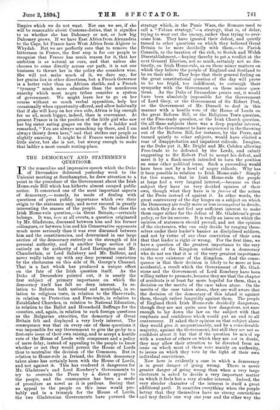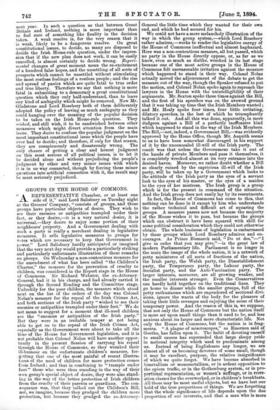THE DEMOCRACY AND STATESMEN'S QUESTIONS.
IN the masculine and impressive speech which the Duke of Devonshire delivered yesterday week to the Unionist meeting at Southampton, he drew attention to a point in the procedure of the Government about the Irish Home-rule Bill which has hitherto almost escaped public notice. It concerned one of the most important aspects of democracy,— namely, its mode of dealing with questions of great public importance which owe their origin to the statesmen only, and never succeed in greatly interesting the masses of the people. To that class the Irish Home-rule question,—in Great Britain,—certainly belongs. It was, here at all events, a question originated by Mr. Gladstone, discussed between him and his former colleagues, or between him and his Conservative opponents much more seriously than it was ever discussed between him and the constituencies, and determined in one large section of the democracy entirely on the strength of his personal authority, and in another large section of it entirely on the authority of Lord Hartington and Mr. Chamberlain, or Lord Salisbury and Mr. Balfour, and never really taken up with any deep personal conviction by the electorates on this side of St. George's Channel. That is a fact which has produced a unique effect on the fate of the Irish question itself. As the Duke of Devonshire pointed out, it is nearly the first subject of primary importance on which the democracy itself has felt no deep interest. In re- lation to Reform both national and municipal, in re- lation to religious tests, in relation to the Slave-trade, in relation to Protection and Free-trade, in relation to Established Churches, in relation to National Education, in relation to the Ballot and Household Suffrage for the counties, and, again, in relation to such foreign questions as the Bulgarian atrocities, the democracy of Great Britain felt and displayed a very lively interest. The consequence was that on every one of these questions it was impossible for any Government to give the go-by to a first-rate issue of their own raising, and to accept a hostile vote of the House of Lords with composure and a policy of mere delay, instead of appealing to the people to know whether or not they would permit the House of Lords thus to neutralise the decision of the Commons. But in relation to Home-rule in Ireland, the British democracy taken alone has certainly been with the House of Lords, and not against it. This has rendered it dangerous for Mr. Gladstone's and Lord Rosebery's Governments to try to overrule the Peers by a direct appeal to the people, and the consequence has been a mode of procedure as novel as it is perilous. Seeing that an appeal to the people on this issue would pro- bably end in a triumph for the House of Lords, the two Gladstonian Governments have pursued the strategy which, in the Punic Wars, the Romans used to call a "Fabian strategy,"—a strategy, that is, of delay, trying to wear out the enemy, rather than trying to over- come him. They have ignored their defeat, and quietly turned to other questions on which they believed Great Britain to be more decidedly with them,—to Parish Councils, to the taxation of the rich, to Scotch and Welsh Disestablishment,—hoping thereby to get a verdict at the next General Election, not so much, certainly not so dis- tinctly, on Irish Home-rule, as on these minor matters on which they believe the people of England and Scotland to be on their side. They hope that their general feeling on the great constitutional question of the day will prove to be too frigid, too indifferent, to outweigh their sympathy with the Government on these minor ques- tions. As the Duke of Devonshire points out, it would have been absolutely impossible for the Government of Lord Grey, or the Government of Sir Robert Peel, or the Government of Mr. Disraeli to deal in this manner with a hostile vote of the House of Lords on the great Reform Bill, or the Religious Tests question, or the Free-trade question, or the Irish Church question. On all these subjects there was a deep popular interest, and for the Government to have acquiesced in the throwing out of the Reform Bill, for instance, by the Peers, and turned quietly to other subjects, would have elicited a roar of disapprobation and impatient ridicule. Imagine, as the Duke put it, Mr. Bright and Mr. Cobden allowing Free-trade to be defeated by the Lords, and calmly suggesting to Sir Robert Peel to accept his defeat, and meet it by a flank-march intended to turn the position on some other political issue. Such a proceeding would have been met by a howl of angry ridicule. Why has it been possible in relation to Irish Home-rule P Simply for this reason, that in Irish Home-rule the people at large feel a very languid interest,—because on that subject they have no very decided opinion of their own, though what they have is in favour of the action of the Peers instead of against it. In other words, the great controversy of the day hinges on a subject on which the Democracy are really more or less incompetent to decide, on which they do not feel any sufficient interest to make them eager either for the defeat of Mr. Gladstone's great policy, or for its success. It is really an issue on which the opinion of statesmen should prevail, and not the opinion of the electorates, who can only decide by ranging them- selves under their leader's banner as disciplined soldiers, and not by virtue of any clear conviction of their own that that leader is right or wrong. For the first time, we have a question of the greatest importance to the very existence of the Kingdom submitted to a democracy who do not see that it is of the very greatest importance to the very existence of the Kingdom. And the conse- quence is that their decision is likely to be more or less accidental, a result which the Government of Mr. Glad- stone and the Government of Lord Rosebery have been willing rather to promote, because they see that the chapter of accidents is at least far more hopeful for them, than a decision on the merits of the case taken alone. On the merits of the case taken alone, they are well aware that the decision of the democracy of this island is against them, though rather languidly against them. The people of England think Irish Home-rule decidedly dangerous, though they are not quite sure how dangerous, not sure enough to lay down the law on the subject with that emphasis and confidence which would put an end to all controversy. If asked their opinion on that subject alone they would give it unquestionably, and by a considerable majority, against the Government, but still they are not so confident about it but that if the question be mixed up with a number of others on which they are not in doubt, they may allow their attention to be diverted from an issue on which most of them vote mainly on authority, to issues on which they vote by the light of their own individual convictions.
Now here is evidently a case in which a democracy is in great danger of going wrong. There is never greater danger of going wrong than when a very large electorate is asked to decide a very important matter on which it feels but a very slender interest. Indeed, the very slender character of the interest is itself a great additional peril. It unsettles everything when the people betray that they themselves have no strong convictions and may decide one way one year and the other way the next year. In such a question as that between Great Britain and Ireland, nothing is more important than to feel sure of something like finality in the decision taken. A weak resolve is, for the very reason that it is weak, likely to be a dangerous resolve. On great constitutional issues, to decide, as many are disposed to decide the Irish Home-rule question, under the impres- sion that if the new plan does not work, it can be easily cancelled, is almost certainly to decide wrong. Experi- mental changes of great moment mean the re-excitement of a hundred false hopes, and the unsettling of all sorts of prospects which cannot be unsettled without stimulating the most restless feelings of a restless people ; and the rise and spread of panics which are quite fatal to true order and true liberty. Therefore we say that nothing is more fatal in submitting to a democracy a great constitutional question which they only half-understand, than to leave any kind of ambiguity which might be removed. Now Mr. Gladstone and Lord Rosebery both of them deliberately adopted the policy of leaving as much ambiguity as they could hanging over the meaning of the popular decision to be taken on the Irish Home-rule question. They wished, and still wish, it to be sandwiched between other measures which might divert attention from the main issue. They desire to confuse the popular judgment on the most important constitutional issue which the people have ever had. to decide; and therefore, if only for that reason, they are conspicuously and disastrously wrong. The only chance of getting a clear and honest judgment on this most serious of all political issues, is to let it be decided alone and without prejudicing the people's judgment by other and very minor issues with which it is in no way connected, though by forcing these minor questions into artificial connection with it, the result may be most seriously prejudiced.







































 Previous page
Previous page